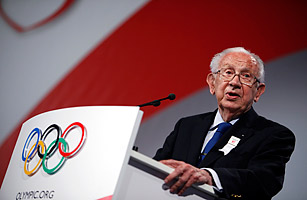
In 1980, Juan Antonio Samaranch become the seventh President of the International Olympic Committee (IOC), an organization then beleaguered by boycotts and on the brink of bankruptcy. But over his 21-year tenure, the former diplomat, who died Apr. 21, transformed the Olympic Games into the modern, popular and lucrative sporting event it is today.
Born in Barcelona on July 17, 1920, Samaranch was himself an athlete who dabbled in soccer, roller hockey and table tennis before being elected to public office in 1954. He served as a sports official in Francisco Franco's regime and eventually became Spain's ambassador to the Soviet Union in 1977. That diplomatic expertise would come in handy during his IOC presidency, where Samaranch often walked a tightrope between Communist and Western nations to negotiate participation in the Games. An avid traveler with a tireless work ethic, Samaranch's success in revamping the Games was due in no small part to his autocratic and abrasive manner. The Olympics saw the number of participating athletes and nations double during his stint, and Samaranch changed the IOC landscape, too, in 1981, when he appointed the committee's first two female members.
But while Samaranch's rule at the IOC was unparalleled in influence, it wasn't without scandal or controversy. Several IOC members were fired in the late nineties for accepting bribes to name Salt Lake City the host of the 2002 Winter Games, and Samaranch himself was criticized for turning a blind eye to the growing doping problems that plague the Games, an accusation he denied.
Shortly after he stepped down in 2001, Samaranch became Honorary President for Life of the IOC, a fitting title for a leader whose impact, however controversial, will surely be felt for generations.